Tokyu Corporation
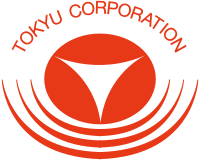 | |
| Public KK | |
| Traded as | TYO: 9005 |
| Industry | Private railroad |
| Founded | September 2, 1922 |
| Headquarters | 5-6 Nanpeidaicho, Shibuya-ku, Tokyo, Japan |
Area served | Tokyo and Kanagawa. |
Key people |
President-Director Chairperson Representative Director Kiyobumi Kamijo Toshiaki Koshimura |
| Services |
passenger railways other related services |
| Owner |
Dai-ichi Mutual Life Insurance Co. (6.8%) Nippon Life Insurance Co. (6.0%) |
| Website |
www |
The Tokyu Corporation (東京急行電鉄株式会社 Tōkyō Kyūkō Dentetsu Kabushiki-gaisha), also known in Japanese as Tōkyū Dentetsu (東急電鉄) for short, is a major private railway company, land developer, hotel and retail store operator in the Greater Tokyo Area of Japan. Part of the Tokyu Group of companies, Tokyu Corporation's headquarters are located in Shibuya, Tokyo.[1]
The company was first registered on September 2, 1922 as the Meguro-Kamata Electric Railway (目黒蒲田電鉄 Meguro Kamata Dentetsu), and was later known as the Tokyo-Yokohama Electric Railway (東京横浜電鉄 Tōkyō Yokohama Dentetsu) before gaining its current name in 1943. From 1944 to 1948, it also owned the companies now known as Keikyu, Keio Corporation, and Odakyu Electric Railway. During this time, it was colloquially known as Dai-Tokyu (lit. Great Tokyu).
Tokyu lines
| Line | Symbol | Route | Length (km) | Stations | Date opened | Max speed (km/h) |
|---|---|---|---|---|---|---|
| Tōyoko Line | TY | Shibuya – Yokohama | 24.2 | 21 | 1926 | 110 |
| Meguro Line | MG | Meguro – Hiyoshi | 11.9 | 13 | 1923 | 110 |
| Den-en-toshi Line | DT | Shibuya – Chūō-Rinkan | 31.5 | 27 | 1907 | 110 |
| Ōimachi Line | OM | Ōimachi – Mizonokuchi | 10.4 | 15 | 1927 | 85 |
| Ikegami Line | IK | Gotanda – Kamata | 10.9 | 15 | 1922 | 80 |
| Setagaya Line | SG | Sangen-Jaya – Shimo-Takaido | 5.0 | 10 | 1925 | 40 |
| Tamagawa Line | TM | Kamata – Tamagawa | 5.6 | 7 | 2000 | 80 |
| Total (7 lines) | 99.5 | 96 |
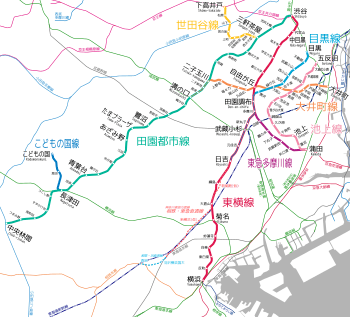
Tokyu also operates the KD Kodomonokuni Line (Nagatsuta Station - Kodomonokuni Station, 3.4 km) under contract with and on behalf of Yokohama Minatomirai Railway Company.
Related businesses
The Tokyu Group also owns two smaller railroad companies (Ueda Kōtsū, Izukyū Corporation), several bus companies and a major upscale department store chain called Tokyu in Japan and stores overseas (such as in the MBK Center in Bangkok, Thailand). Other retail operations include Tokyu Hands stores (except for the two locations in Nagoya, which are owned by Sanko Creative Life, Inc., and operated under license). It also runs a number of hotels under the names Tokyu/Pan Pacific in Japan and formerly owned the Pan Pacific Hotels abroad, which it sold to UOL Limited of Singapore.
Formerly the owner of Japan Air System (JAS, now merged with the flag carrier JAL Japan), Tokyu is the largest shareholder of Japan Airlines Holdings (JAL) following JAS's merger with JAL. The Tokyu Group also owns and operates the upscale Tokyu Hotels and budget Tokyu Inns.
From 1958 until 2001, Tokyu also owned the Japanese (now American) Shirokiya department store company. It was the owner of Mago Island until 2005, when Mel Gibson purchased it for US$15 million.
Rolling stock
- Tokyu 8500 series (since 1975)
- Tokyu 8090 series (since 1980)
- Tokyu 7600 series (since 1986)
- Tokyu 9000 series (since 1986)
- Tokyu 7700 series (since 1987)
- Tokyu 1000 series (since 1988)
- Tokyu 2000 series (since 1992)
- Tokyu 300 series (Setagaya Line, since 1999)
- Tokyu 3000 series (since 1999)
- Tokyu 5000 series (since 2002)
- Tokyu 7000 series (since 2007)
- Tokyu 6000 series (since 2008)
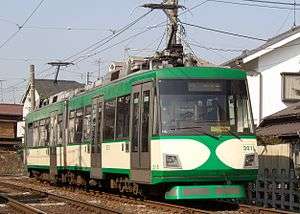 Tokyu 300 series
Tokyu 300 series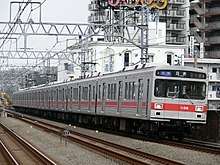 Tokyu 1000 series
Tokyu 1000 series Tokyu 2000 series
Tokyu 2000 series Tokyu 3000 series
Tokyu 3000 series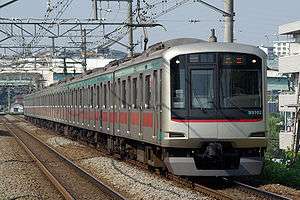 Tokyu 5000 series
Tokyu 5000 series_Express_20180319.jpg) Tokyu 6000 series
Tokyu 6000 series Tokyu 7700 series
Tokyu 7700 series Tokyu 8000 series
Tokyu 8000 series Tokyu 8090 series
Tokyu 8090 series Tokyu 8500 series
Tokyu 8500 series Tokyu 9000 series
Tokyu 9000 series
Planned rolling stock
- Tokyu 2020 series (from spring 2018)
- Tokyu 6020 series (from spring 2018)
New Tokyu 2020 series ten-car EMUs are scheduled to enter service on the Tokyu Den-en-toshi Line from spring 2018.[2] New Tokyu 6020 series seven-car EMUs are also scheduled to enter service on the Tokyu Oimachi Line from spring 2018.[3]
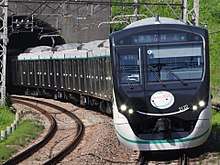 Tokyu 2020 series
Tokyu 2020 series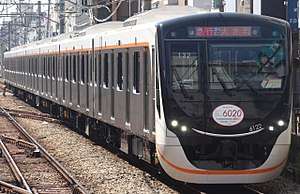 Tokyu 6020 series
Tokyu 6020 series
See also
References
- ↑ "会社概要 Archived 2009-11-22 at the Wayback Machine.." Tokyu Corporation. Retrieved on November 27, 2009.
External links
| Wikimedia Commons has media related to Tokyu Corporation. |
- Official website (in English)